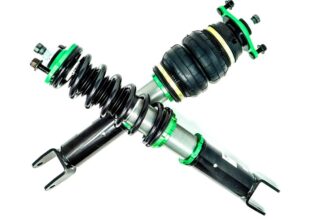Temperature control plays a crucial role in the manufacturing industry, ensuring quality, consistency, and efficiency across various processes. From heat treatment to curing and drying, the ability to maintain precise temperature levels impacts the production of countless products, including electronics, aerospace components, and pharmaceuticals. As manufacturing technology advances, the importance of reliable temperature control systems has grown, offering better results and improved sustainability. See why temperature control is vital in manufacturing, its applications, and how modern technology, including temperature-controlled industrial ovens, is revolutionizing the industry.
The Importance of Temperature Control in Manufacturing
In manufacturing, temperature affects the chemical and physical properties of materials. Processes such as curing, annealing, and drying depend on specific temperature ranges to achieve desired results. Deviations from these ranges can lead to product defects, compromised performance, or even safety risks.
Key Reasons Why Temperature Control Matters
- Product Quality and Consistency
Precise temperature control ensures that every product meets the same quality standards. Whether it’s curing a composite material or baking ceramics, maintaining the right temperature minimizes defects and reduces waste. - Material Integrity
Many materials, such as metals and plastics, undergo structural changes when exposed to certain temperatures. Controlled heating and cooling help maintain the integrity of these materials, ensuring their performance in real-world applications. - Energy Efficiency
Proper temperature control minimizes energy waste. Modern equipment like energy-efficient ovens optimizes heating and cooling cycles, reducing overall operational costs. - Process Optimization
Accurate temperature regulation enables manufacturers to streamline production cycles. Processes are completed faster and with fewer errors, boosting overall productivity.
Applications of Temperature Control in Manufacturing
1. Heat Treatment
Heat treatment processes, such as annealing, tempering, and hardening, rely on precise temperature control to alter the physical properties of metals. These processes are essential in industries like automotive and aerospace, where materials must withstand extreme conditions.
- Example: A batch of aerospace-grade aluminum might require uniform heating to 500°C for several hours to improve its strength. Without accurate temperature control, the material could become brittle or fail under stress.
2. Curing and Drying
Curing involves chemical reactions that occur at specific temperatures, such as hardening adhesives or composites. Similarly, drying processes in industries like ceramics or textiles require precise control to prevent uneven moisture removal.
- Advanced curing ovens are a critical component in ensuring uniform temperature distribution, especially in sensitive applications like electronics manufacturing.
3. Pharmaceutical Manufacturing
In the pharmaceutical industry, temperature control is vital for processes like sterilization and drying active ingredients. Even slight variations can affect the efficacy and safety of the final product.
- Specialized industrial ovens are designed to meet the stringent requirements of pharmaceutical production, offering both precision and compliance with regulatory standards.
4. Electronics Manufacturing
The production of electronic components, such as semiconductors and PCBs (printed circuit boards), requires exact temperature conditions. Overheating can damage delicate components, while insufficient heat might result in poor conductivity.
The Role of Modern Technology in Temperature Control
1. Smart Temperature Control Systems
The integration of IoT and smart sensors has transformed traditional manufacturing equipment. Today’s systems can monitor and adjust temperature in real-time, ensuring optimal performance with minimal human intervention. For example, smart industrial ovens can detect temperature fluctuations and make immediate adjustments to maintain consistency.
2. Uniform Heat Distribution
Achieving uniform temperature across all parts of a product is challenging, especially in large-scale manufacturing. Modern ovens, such as those provided by Despatch, are designed with advanced airflow systems to ensure even heat distribution, reducing the risk of hotspots.
3. Energy Efficiency
With sustainability becoming a priority, energy-efficient technologies are gaining traction. Industrial ovens now feature insulation, advanced heating elements, and programmable controls to minimize energy consumption without compromising performance.
Benefits of Using Temperature-Controlled Industrial Ovens
Temperature-controlled industrial ovens have become a staple in manufacturing due to their precision, reliability, and versatility. They are used across multiple industries, from aerospace to electronics, to meet specific production needs.
Key Advantages
- Enhanced Precision
These ovens maintain tight temperature tolerances, ensuring that processes like curing and annealing are completed flawlessly. - Scalability
Whether it’s a small batch or large-scale production, industrial ovens can be customized to suit the required output. - User-Friendly Features
Modern ovens come with intuitive interfaces and programmable settings, making it easy to manage complex manufacturing processes. - Durability and Longevity
High-quality ovens from industry leaders like Despatch are built to withstand the demands of industrial environments, offering long-term reliability.
Choosing the Right Equipment
Selecting the right temperature control equipment is critical for manufacturing success. Consider the following factors when evaluating options:
- Application Needs: Identify the specific requirements of your manufacturing process, such as temperature range, chamber size, and airflow design.
- Energy Efficiency: Look for equipment with features that reduce energy consumption.
- Compliance: Ensure the equipment meets industry standards and regulations, particularly in highly regulated sectors like pharmaceuticals or aerospace.
Conclusion
Temperature control is a cornerstone of modern manufacturing, impacting product quality, efficiency, and sustainability. Advanced technologies, such as smart temperature systems and energy-efficient industrial ovens, have transformed the way manufacturers approach heat-sensitive processes.
Whether it’s curing, drying, or heat treatment, precise temperature regulation is essential to achieving consistent results. By investing in high-quality equipment like temperature-controlled industrial ovens and advanced curing ovens, manufacturers can optimize their operations, reduce waste, and stay ahead in a competitive market.
The importance of temperature control cannot be overstated—it’s not just about reaching the right heat level; it’s about maintaining it with precision, every time.














